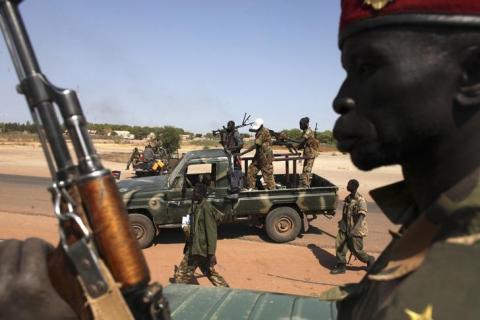Advertisement
Fighting erupts in two South Sudan states days after latest truce
JUBA (Reuters) - Rebels in South Sudan stormed towns in two states on Tuesday and were repulsed, the army said, barely a week after signing another ceasefire deal with the government that was meant to end 15 months of conflict.
Thousands of people have been killed and over a million have fled their homes since fighting erupted in the world's newest nation in December 2013, triggered by a power struggle between President Salva Kiir and former vice president Riek Machar.
A January 2014 ceasefire was broken frequently and peace talks often faltered, frustrating South Sudan's Western backers.
Philip Aguer, spokesman for South Sudan's army, the SPLA, said Tuesday's attacks had occurred in Bentiu, capital of oil-producing Unity state, and in Upper Nile State, both in the north of the country.
"A ground attack was launched by the rebels in Upper Nile today on SPLA positions in Obudo County using a big force supported by heavy machine guns," Aguer told Reuters.
"Another area of violation by the rebels was in Unity state. The rebels shelled SPLA force positions in Bentiu north of the town this morning."
He gave no details of casualties and said the SPLA had repulsed the rebels and captured two vehicles and heavy machine guns. Aguer added that fighting was still raging in Upper Nile.
The rebels were not immediately reachable for comment.
Farhan Haq, deputy spokesman for U.N. Secretary General Ban Ki-moon, said the U.N. mission in South Sudan confirmed shelling occurred in Bentiu and Nassir in Upper Nile.
Earlier this month, Kiir and Machar forged another ceasefire agreement aimed at pushing them closer to a final deal to end the conflict that has hurt the oil-producing state.
The European Union and United States have imposed sanctions on commanders on both sides for ceasefire violations.
The conflict has created a humanitarian crisis in South Sudan, which declared independence from Sudan in 2011, and has exacerbated ethnic tensions between Kiir's Dinka people and Machar's Nuer.
The United Nations said on Monday donors had pledged more than $500 million in aid out of $1.8 billion it has appealed for to fund the emergency response to South Sudan this year.
Previous outbreaks of fighting have damaged Unity State oil fields, cutting output that now stands at about 169,000 barrels per day for the whole country, down from 245,000 barrels per day in December 2013.



















Add new comment